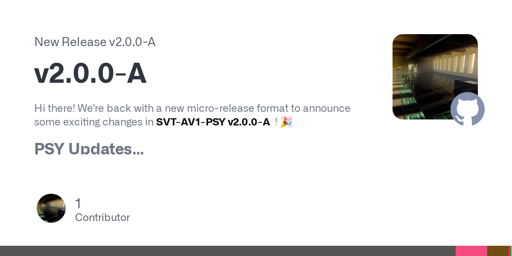- cross-posted to:
- [email protected]
- cross-posted to:
- [email protected]
Hi there! We’re back with a new micro-release format to announce some exciting changes in SVT-AV1-PSY v2.0.0-A! 🎉
PSY Updates
Features
- The CRF range, previously capped at 63, has been extended to a maximum value of 70. It can also be incremented in quarter increments of 0.25
- New option:
--enable-dlf 2for a slower, more accurate deblocking loop filter - New option:
--qp-scale-compress-strength(0 to 3) which sets a strength for the QP scale algorithm to compress values across all temporal layers. Higher values result in more consistent video quality - New option:
--frame-luma-bias(0 to 100) enables experimental frame-level luma bias to improve quality in dark scenes by adjusting frame-level QP based on average luminance across each frame
Quality & Performance
- A temporal layer qindex offset has been added to Tune 3 for more consistent quality across frames when encoding
- Minor speed bump to Preset 8
- Dynamic delta_q_res switching implemented to help reduce signaling overhead, which should improve quality especially at CRF ≥40
- Other general improvements to Tune 3
Documentation
- PNG images have been replaced with smaller lossless WebP images, resulting in faster loading & repository cloning times.
- More consistent & thorough PSY Development page, including build instructions
Bug Fixes
- Help menu formatting adjusted for less frequent underlining
--progress 2no longer reports the same information as--progress 3
Other
- Introducing PSY Micro-releases! Each micro-release will be marked with a letter, bringing a bundle of new features & improvements. The release letter will reset back to the initial
Aeach time our mainline version is updated. More info can be found in this project’s README & the PSY Development page
Thanks for using SVT-AV1-PSY! ♥️
Full Changelog: https://github.com/gianni-rosato/svt-av1-psy/commits/v2.0.0-A



There are ongoing comparisons that are almost always favorable. If you personally don’t feel the same way, you can simply use vanilla SVT settings within PSY.
Cool work, man! I’ll have to try it out